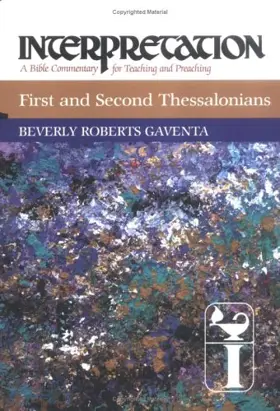

First and Second Thessalonians
Pages
138
Publisher
Westminster John Knox
Published
1/1/1998
ISBN-13
9780804231428
Collections
This book appears in the following featured collections.
- Commentaries by Female Scholars by John Dyer
- Women and BIPOC by Jamie Davies
- New Testament Commentaries & Monographs by Princeton Theological Seminary
- Nijay Gupta's Top NT Commentaries by Nijay K. Gupta
Reviews
This is a succinct theological commentary. Gaventa hits the goals of the series extremely well, and highlights the pastoral and eschatological notes of Paul to the Thessalonians, and how those two dimensions relate to each other.
Gaventa masterfully provides a theological exposition of these letters. She gives special attention to the maternal imagery in these texts (and in Paul in general) and she also addresses Paul’s eschatology more broadly.
[Full Review]
Louisville: John Knox Press, 1998. Pp. xiv + 138, Cloth, $22.00, ISBN 0804231427. Michael Holmes Bethel College St. Paul, MN 55112 The volumes in the Interpretation commentary series stand apart from most other commentaries in that they seek to explicate not only the meaning of an ancient text but also its significance for modern communities of faith. Gaventa accomplishes both of these tasks with style and excellence, offering an informed and sophisticated reading of the text and a thoughtful, theologically grounded analysis of its contemporary Christian significance. With respect to traditional introductory questions, Gaventa takes a what may be described as a mainstream critical approach. Acts is utilized only to supplement and only when it does not contradict Paul's own account. Paul wrote 1 Thessalonians (including 2:14-16) around 51 C.E. to a congregation composed primarily (if not entirely) of Gentile believers. After briefly noting the welter of suggestions regarding the epistolary, rhetorical, and structural aspects of the letter, Gaventa suggests that it is not a letter of self-defense but (adopting the suggestion of T. H. Olbricht) seeks to consolidate or confirm the Thessalonian disciples in their new faith. 2 Thessalonians is a piece of deliberative rhetoric written near the end of the first century C.E., perhaps by one of Paul's coworkers or students, to encourage its readers to remain steadfast in the face of external persecution and internal problems.
[Full Review]



